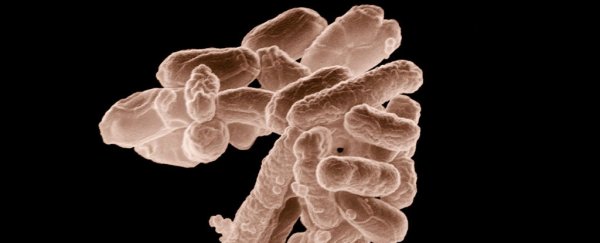In the fight to stop antibiotic-resistant bacteria (AKA superbugs), bacteria are definitely winning this round.
With antibiotic resistance strains arising hard and fast, some scientists say superbugs that can't be treated by existing medications could be the greatest public health threat of our time.
But who's causing this superbug crisis, and what do we need to do to fight it?
Researchers in Australia are trying to answer that question, and say a global approach is needed – with all countries stepping up their game to fight antibiotic resistance. And overuse of over-the-counter antibiotics isn't the only factor to blame.
"We are in a global village so we can't ignore what happens elsewhere in the world where antibiotic stewardship may not be a priority or stringently enforced," said Steven Djordjevic, from the University of Technology Sydney's ithree Institute.
"We have to limit antimicrobial use and prevent over-the-counter access without prescription because ultimately resistance to multiple microbials will end up in our backyard," he added. But that's not the whole story.
The research also shows that the use of antibiotics food production, such as animal farming, is contributing to the rise of superbugs.
"Contamination of waste effluent from hospitals and intensive food animal production with antimicrobial residues is an immense global problem," the researchers write in a new paper on the subject in Frontiers in Microbiology.
"Despite these concerns there is only a limited understanding of how antimicrobial residues contribute to the global problem of antimicrobial resistance."
In case you need a bit of a refresher, the animal livestock industry is the highest user of antibiotics - more so then the medical industry.
These antibiotics keep the animals that are farmed in high concentrations, such as chickens and pigs, healthy, but can also make the animals plumper - which makes them used even more widely.
"Large-scale animal production facilities generate huge volumes of animal waste contaminated with veterinary antibiotics and other antimicrobial agents," said Djordjevic.
"That waste material ends up in ponds that are pumped on to fields where fruit and vegetables are produced. It also ends up in aquatic ecosystems."
Djordjevic's team are now using pigs to investigate exactly how their gut bacteria respond to antibiotics and probiotics.
Although the Australian team admit that this is a small issue in Australia, worldwide antibiotics in the pork industry are a source of antibiotic resistance.
"There are several strategies that can be used to help reduce the global reliance on antibiotics," he said. "These include developing and applying better vaccines, increasing probiotic and prebiotic use and using phage therapy instead of antibiotics in both agriculture and medicine."
Phage therapy is an exciting way of removing our dependence on antibiotics.
Some viruses have the ability to infect and replicate inside bacteria. They are already being used as an antibiotics alternative in Central Europe and Russia, and could be our next line of defence against superbugs.
But for the moment, the onus is on the global community to step back, and look at other ways of limiting our antibiotics use.
"Ultimately we need a concerted effort by all of the world's food producers to reduce the reliance on antibiotics in intensive food animal production," Djordjevic said.
Without antibiotics, modern medicine could grind to a halt – and no one wants that.
The study was published in Frontiers in Microbiology.
UTS Science is a sponsor of ScienceAlert. Find out more about their research.
